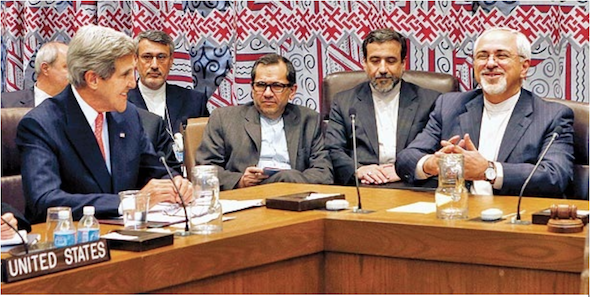Almost 35 years after American diplomats were held hostage in their own embassy by Iranian revolutionaries for 444 days, a new diplomatic relationship has been established between Tehran and Washington. And in December, a breakthrough was made during negotiations, which led to a temporary yet significant agreement that gave both parties time to regroup and prepare for further deliberations to forge a more permanent deal. What each side is ultimately trying to achieve: Recently, Iran declared that it would advance its nuclear program. This raised fears that the regime is attempting to develop a nuclear weapon instead of providing fuel for its nuclear reactors, which Tehran claims is the main objective behind this decision. In response, world powers, especially the United States, have strengthened international sanctions on Iran. However, as a more liberal mood becomes dominant in the country, led by the newly-elected President Hassan Rouhani, talks have been opened for the first time in decades. After years of economic decline, Iran wants an end to virtually all sanctions, including those blocking crucial oil revenues. This would give it a springboard toward a much needed economic revival, and open up a new chapter in Iran’s history by enabling it to secure a more active role in the international community. For instance, after the temporary nuclear deal was signed, Iran, an important ally with the Syrian government, was invited to join in the Syrian peace talks. Iran also wants to continue its nuclear research for public use, such as the development of electricity. This is a sore point with the other party, the US, as its main goal is to prevent any enrichment of uranium, which could be used either to power nuclear reactors or create nuclear arms. What has already been achieved: A sixth-month deal has been signed by both sides and is scheduled to go into effect on January 20. After months of intense diplomacy and threats to discontinue negotiations, Tehran has agreed to halt all enrichment of uranium above 5% during the sixth-month period, and to eliminate its stores of uranium already enriched to 20%, which is close to what is needed to fuel a nuclear bomb. Also, Iran has been barred from obtaining and activating more centrifuges, which is a key component in the process of enrichment. In exchange, the U.S. and other world powers have lifted certain trade embargos and given back access to about $7 billion in funds, including $4.2 billion in oil revenues. There was protesting by Iranian hard-liners demanding that more sanctions be removed and the U.S. do more on its part. But an agreement was reached. What may cause the talks to collapse: Although both Presidents are doing their utmost to silence the dissenters at home, opposition against the already-fragile agreement is rising. In the United States, senators from both political parties are planning to introduce more sanctions to pressure Iran. Some are even calling for U.S. military intervention in favor of Israel if Israel decides to preemptively attack Iran. In response, the White House has expressed frustration. “For the sake of our national security and the peace and security of the world, now is the time to give diplomacy a chance to succeed,” said President Obama on January 12, warning that further action could foil one of the most successful attempts to improve relations between the two countries. In Iran, political hard-liners in the government are trying to propose a new bill. This bill, which has already won the support of more than a third of Iran’s parliament, would permit the enrichment of uranium up to 60%, which would bring the level of enrichment much closer to the amount needed for a nuclear bomb. If a final deal is successfully implemented, it could lead to the warming of relations between Iran and the United States in more than 60 years, which would provide many benefits for both sides. For example, the two share a common enemy: Al-Qaeda. After the U.S. withdrawal from Afghanistan and Iraq, branches of extremist groups such as Al-Qaeda have become more active in the Middle East and are a cause of great concern to both countries. By combining forces, Iran and the U.S. could make a significant impact on the spread of violence in the region. However, should negotiations fail, a permanent halt to any kind of diplomacy would be inevitable between the two countries. Also, in the scenario that Iran succeeds in constructing a nuclear device, Israel could feel threatened and attack Iran, which would drag in Russia and the U.S. through various alliances, potentially causing a catastrophic conflict. The decision on a permanent agreement between the two countries could very likely change the course of history.


